Fleurs du Mal Magazine


Or see the index
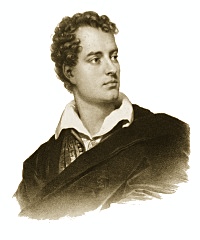
Oh! Snatched Away in Beauty’s Bloom
Oh! snatched away in beauty’s bloom,
On thee shall press no ponderous tomb;
But on thy turf shall roses rear
Their leaves, the earliest of the year;
And the wild cypress wave in tender
gloom:
And oft by yon blue gushing stream
Shall sorrow lean her drooping head,
And feed deep thought with many a dream,
And lingering pause and lightly tread;
Fond wretch! as if her step disturbed the
dead!
Away! we know that tears are vain,
That death nor heeds nor hears distress:
Will this unteach us to complain?
Or make one mourner weep the less?
And thou – who tell’st me to forget,
Thy looks are wan, thine eyes are wet.
George Gordon Byron
(1788 – 1824)
Oh! Snatched Away in Beauty’s Bloom
(Poem)
• fleursdumal.nl magazine
More in: Archive A-B, Archive A-B, Byron, Lord
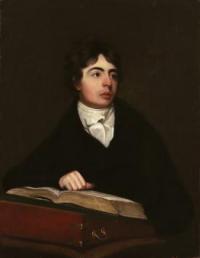
The Pauper’s Funeral
What! and not one to heave the pious sigh!
Not one whose sorrow-swoln and aching eye
For social scenes, for life’s endearments fled,
Shall drop a tear and dwell upon the dead!
Poor wretched Outcast! I will weep for thee,
And sorrow for forlorn humanity.
Yes I will weep, but not that thou art come
To the stern Sabbath of the silent tomb:
For squalid Want, and the black scorpion Care,
Heart-withering fiends! shall never enter there.
I sorrow for the ills thy life has known
As thro’ the world’s long pilgrimage, alone,
Haunted by Poverty and woe-begone,
Unloved, unfriended, thou didst journey on:
Thy youth in ignorance and labour past,
And thine old age all barrenness and blast!
Hard was thy Fate, which, while it doom’d to woe,
Denied thee wisdom to support the blow;
And robb’d of all its energy thy mind,
Ere yet it cast thee on thy fellow-kind,
Abject of thought, the victim of distress,
To wander in the world’s wide wilderness.
Poor Outcast sleep in peace! the wintry storm
Blows bleak no more on thine unshelter’d form;
Thy woes are past; thou restest in the tomb;–
I pause–and ponder on the days to come.
Robert Southey
(1774 – 1843)
The Pauper’s Funeral
• fleursdumal.nl magazine
More in: Archive S-T, Archive S-T, CLASSIC POETRY
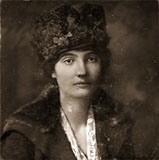
Autumn Communion
This autumn afternoon
My fancy need invent
No untried sacrament.
Man can still commune
With Beauty as of old:
The tree, the wind’s lyre,
The whirling dust, the fire—
In these my faith is told.
Beauty warms us all;
When horizons crimson burn,
We hold heaven’s cup in turn.
The dry leaves gleaming fall,
Crumbs of mystical bread;
My dole of Beauty I break,
Love to my lips I take,
And fear is quieted.
The symbols of old are made new:
I watch the reeds and the rushes,
The spruce trees dip their brushes
In the mountain’s dusky blue;
The sky is deep like a pool;
A fragrance the wind brings over
Is warm like hidden clover,
Though the wind itself is cool.
Across the air, between
The stems and the grey things,
Sunlight a trellis flings.
In quietude I lean:
I hear the lifting zephyr
Soft and shy and wild;
And I feel earth gentle and mild
Like the eyes of a velvet heifer.
Love scatters and love disperses.
Lightly the orchards dance
In a lovely radiance.
Down sloping terraces
They toss their mellow fruits.
The rhythmic wind is sowing,
Softly the floods are flowing
Between the twisted roots.
What Beauty need I own
When the symbol satisfies?
I follow services
Of tree and cloud and stone.
Color floods the world;
I am swayed by sympathy;
Love is a litany
In leaf and cloud unfurled.
Gladys Cromwell
(1885-1919)
Autumn Communion
• fleursdumal.nl magazine
More in: 4SEASONS#Autumn, Archive C-D, Cromwell, Gladys, Gladys Cromwell
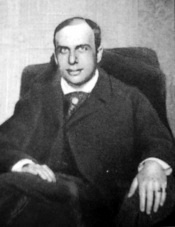
Rasant les murs du port…
Rasant les murs du port, passent trois matelots.
Le loustic de la bande a dans une bataille
Attrapé sur le nez une profonde entaille,
Il rit et bat à coups de poings les volets clos.
Sous l’obscure lueur sanglante des falots,
Une hôtesse ventrue à mine de futaille
Leur fait signe et tous trois, la prenant par la taille,
Se poussent au comptoir derrière les hublots.
Les mathurins béats, accoudés sur la table,
Avalent éblouis un velours délectable
Versé par le patron dans leurs quarts de fer-blanc.
A côté d’un gabier qui va dégringolant,
De l’escalier graisseux et vermoulu du bouge
Une fille en cheveux descend, la trogne rouge.
Marcel Schwob
(1867-1905)
Rasant les murs du port…
•fleursdumal.nl magazine
More in: Archive S-T, Archive S-T, Marcel Schwob
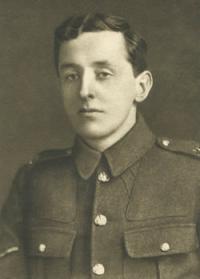
Comrades
Those whom I’ve known, admired, ardently friended
Lie silent there wrapp’d in a soldier’s shroud;
Death broke their dreams, their aspirations ended,
These sanguine youth, noble, brave and proud.
Slowly they bear them ‘neath the dim star light
Unto their rest – the soldiers’ cemetery:
The chaplain chants a low, brief litany;
The nightingale flings rapture on the night.
Back to their Mother Earth this night return
Unnumbered youth along the far-flung line;
But ’tis for these my eyes with feeling burn,
That Memory doth erect a fadeless shrine –
For these I’ve known, admired, ardently friended
Stood by when Death their love, their youth swift ended.
John William (Will) Streets
(1886 –1916)
Comrades
• fleursdumal.nl magazine
More in: - Archive Tombeau de la jeunesse, Archive S-T, Streets, Will, WAR & PEACE
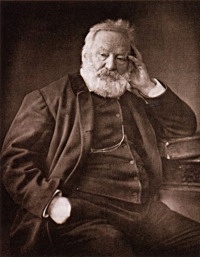
Les femmes sont sur la terre . . . .
Les femmes sont sur la terre
Pour tout idéaliser ;
L’univers est un mystère
Que commente leur baiser.
C’est l’amour qui, pour ceinture,
A l’onde et le firmament,
Et dont toute la nature,
N’est, au fond, que l’ornement.
Tout ce qui brille, offre à l’âme
Son parfum ou sa couleur ;
Si Dieu n’avait fait la femme,
Il n’aurait pas fait la fleur.
A quoi bon vos étincelles,
Bleus saphirs, sans les yeux doux ?
Les diamants, sans les belles,
Ne sont plus que des cailloux ;
Et, dans les charmilles vertes,
Les roses dorment debout,
Et sont des bouches ouvertes
Pour ne rien dire du tout.
Tout objet qui charme ou rêve
Tient des femmes sa clarté ;
La perle blanche, sans Eve,
Sans toi, ma fière beauté,
Ressemblant, tout enlaidie,
A mon amour qui te fuit,
N’est plus que la maladie
D’une bête dans la nuit.
Victor Hugo
(1802-1885)
Les femmes sont sur la terre . . . .
(Poème)
• fleursdumal.nl magazine
More in: Archive G-H, Archive G-H, Hugo, Victor, Victor Hugo
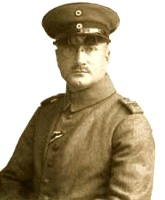
Schwermut
Schreiten Streben
Leben sehnt
Schauern Stehen
Blicke suchen
Sterben wächst
Das Kommen
Schreit!
Tief
Stummen
Wir.
August Stramm
(1874-1915)
Schwermut, 1914
• fleursdumal.nl magazine
More in: *War Poetry Archive, Archive S-T, Expressionism, Stramm, August
The 2016 Nobel Prize in Literature recognized Bob Dylan as a major modern artist, elevating his work beyond the world of popular music.
In this book, Timothy Hampton focuses on the details and nuances of Dylan’s songs, showing how they work as artistic statements designed to create meaning and elicit emotion.
With Bob Dylan’s Poetics, Hampton offers a unique examination of both the poetics and politics of Dylan’s compositions. He studies Dylan not as a pop hero, but as an artist, as a maker of songs.
F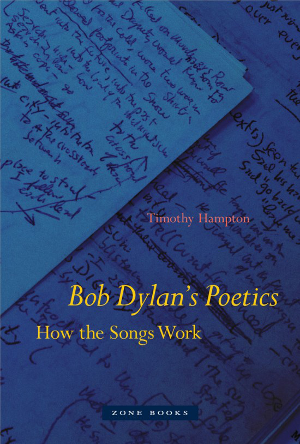 ocusing on the interplay of music and lyric, Hampton traces Dylan’s innovative use of musical form, his complex manipulation of poetic diction, and his dialogues with other artists, from Woody Guthrie to Arthur Rimbaud.
ocusing on the interplay of music and lyric, Hampton traces Dylan’s innovative use of musical form, his complex manipulation of poetic diction, and his dialogues with other artists, from Woody Guthrie to Arthur Rimbaud.
Moving from Dylan’s earliest experiments with the blues through his mastery of rock and country to his densely allusive more recent recordings, Hampton offers a detailed account of Dylan’s achievement.
Locating Dylan in the long history of artistic modernism, he examines the relationships among form, genre, and the political and social themes that crisscross Dylan’s work. With this book, Hampton offers both a nuanced engagement with the work of a major artist and a meditation on the contribution of song at times of political and social change.
Title Bob Dylan’s Poetics
Subtitle How the Songs Work
Author Timothy Hampton
Publisher MIT Press
Title First Published 01 March 2019
Format Hardcover
ISBN-10 1942130155
ISBN-13 9781942130154
Hardcover – $29.95
# more books
Bob Dylan’s Poetics.
How the Songs Work
by Timothy Hampton
• fleursdumal.nl magazine
More in: - Book News, - Bookstores, Archive C-D, Archive C-D, Archive G-H, AUDIO, CINEMA, RADIO & TV, Bob Dylan, Dylan, Bob
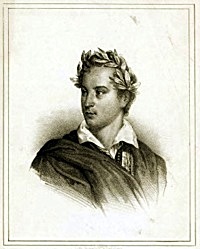
So we’ll go no more a roving
So we’ll go no more a roving
So late into the night,
Though the heart be still as loving,
And the moon be still as bright.
For the sword outwears its sheath,
And the soul wears out the breast,
And the heart must pause to breathe,
And Love itself have rest.
Though the night was made for loving,
And the day returns too soon,
Yet we’ll go no more a roving
By the light of the moon.
George Gordon Byron
(1788 – 1824)
So we’ll go no more a roving
(Poem)
• fleursdumal.nl magazine
More in: Archive A-B, Archive A-B, Byron, Lord
In this innovative study, Tyler Whitney demonstrates how a transformation and militarization of the civilian soundscape in the late nineteenth and early twentieth centuries left indelible traces on the literature that defined the period.
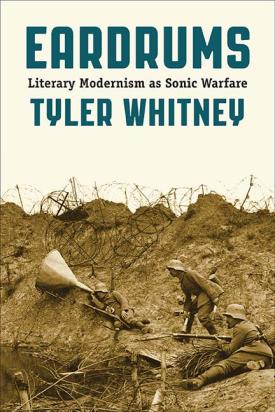 Both formally and thematically, the modernist aesthetics of Franz Kafka, Robert Musil, Detlev von Liliencron, and Peter Altenberg drew on this blurring of martial and civilian soundscapes in traumatic and performative repetitions of war.
Both formally and thematically, the modernist aesthetics of Franz Kafka, Robert Musil, Detlev von Liliencron, and Peter Altenberg drew on this blurring of martial and civilian soundscapes in traumatic and performative repetitions of war.
At the same time, Richard Huelsenbeck assaulted audiences in Zurich with his “sound poems,” which combined references to World War I, colonialism, and violent encounters in urban spaces with nonsensical utterances and linguistic detritus—all accompanied by the relentless beating of a drum on the stage of the Cabaret Voltaire.
Eardrums is the first book-length study to explore the relationship between acoustical modernity and German modernism, charting a literary and cultural history written in and around the eardrum. The result is not only a new way of understanding the sonic impulses behind key literary texts from the period. It also outlines an entirely new approach to the study of literature as as the interaction of text and sonic practice, voice and noise, which will be of interest to scholars across literary studies, media theory, sound studies, and the history of science.
Tyler Whitney is an assistant professor of German at the University of Michigan.
Tyler Whitney (Author)
Eardrums.
Literary Modernism as Sonic Warfare
Cloth Text – $99.95
ISBN 978-0-8101-4022-6
Paper Text – $34.95
ISBN 978-0-8101-4021-9
Northwestern University Press
Publication Date June 2019
Literary Criticism
232 pages
Price: $24.00
# new books
Tyler Whitney
Eardrums.
Literary Modernism as Sonic Warfare
• fleursdumal.nl magazine
More in: # Music Archive, #Archive A-Z Sound Poetry, *War Poetry Archive, - Book News, - Book Stories, Archive W-X, AUDIO, CINEMA, RADIO & TV, DADA, Dadaïsme, Kafka, Franz, Modernisme, Visual & Concrete Poetry
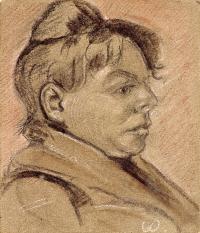
Meer, meer!
Verwond, vermink,
Schiet dood, houw neer!
Roep legers op.
Steeds meer, steeds weer.
Vermorzel ze
Hak z’in elkaar!
Bedenk, het is
uw broeder maar.
Spreek ik zoo goed?
Is ‘t mooi zoo’n lied?..
De mensch sterft uit,
maar ‘t hindert niet!
Agnita Feis
(1881 – 1944)
Uit: Oorlog. Verzen in Staccato (1916).
Meer, meer!
• fleursdumal.nl magazine
More in: *War Poetry Archive, Agnita Feis, Antony Kok, Archive E-F, Feis, Agnita, Theo van Doesburg (I.K. Bonset), WAR & PEACE
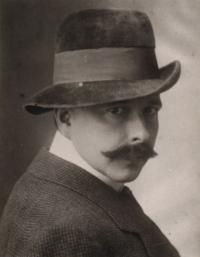 Antony Kok (1882 – 1969)
Antony Kok (1882 – 1969)
Antony Kok, was met Theo van Doesburg en Piet Mondriaan oprichter en medewerker van het avant-gardistische kunsttijdschrift De Stijl (1917 – 1932). Hij was vooral actief als dichter en schrijver van aforismen.
Kees Verwey (1900 -1995)
Tijdens zijn leven, dat bijna een eeuw beslaat, maakte de kunstenaar verschillende ontwikkelingen in de schilderkunst mee. Al op jonge leeftijd kwam hij in aanraking met het werk van George Breitner en Floris Verster. Ook werd hij beïnvloed door Franse (post-)impressionisten en later door de moderne kunst van o.a. Karel Appel en Pablo Picasso. Omringd door de kunst van zijn idolen wordt in deze nieuwe tentoonstelling de enorme vaardigheid en veelzijdigheid van de schilder Verwey duidelijk.
Na hun ontmoeting (in Haarlem in 1953) verklaarde Kees Verwey:
‘Antony Kok had me te pakken. Ruim een jaar ben ik met die ene man bezig geweest. Je zou zeggen dat zoiets ondenkbaar is, maar ik kon niet buiten de visie op die man. Het was een proces dat niet meer kon worden tegengehouden. Ik heb hem er wel eens over ondervraagd, toen zei hij: maar jij hebt die tekeningen niet gemaakt, ik heb ze gemaakt.’
In het eerste jaren van hun kennismaking maakte Verwey meer dan 30 portretten van Kok. De eerste serie zou begin jaren vijftig worden tentoongesteld in Amsterdam, Rotterdam en Haarlem. In 1955 was de serie uitgegroeid tot 40×1 en in Eindhoven te zien.
Lees meer over Kees Verwey, zijn vrienden en favoriete kunstenaars, zoals Karel Appel, Pablo Picasso, Edouard Vuillard, Floris Verster en Antony Kok in de bij de tentoonstelling verschenen publicatie:
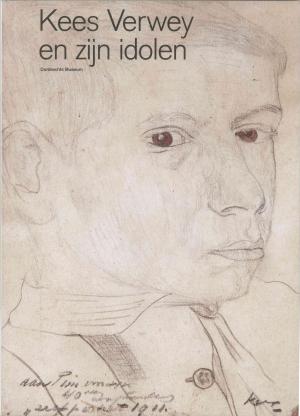
Kees Verwey
en zijn idolen
Dordrechts Museum
2019
ISBN 978-90-71722-30-1
Redactie: Laura van den Hout, Judith Spijksma, Linda Janssen
Publicatie ter gelegenheid van de tentoonstelling ‘Kees Verwey en zijn idolen’, die van 14 juli 2019 tot en met 5 januari 2020 plaatsvindt in het Dordrechts Museum. De tentoonstelling kwam tot stand in samenwerking met Stichting Kees Verwey.
I N H O U D
6
Max van Rooy
Portretten als stillevens en het atelier als goudmijn
12
Karlijn de Jong
De moeder van de moderne kunst
Kees Verwey en De Onafhankelijken
22
Tijdlijn
26
Barbara Collé
Kijk ik naar de een, dan vlamt de ander
Over kleurenparen in Moeders theetafel en Het gele jakje van Kees Verwey, en Stilleven met boeken van Henri Frédéric Boot
34
Iduna Paalman
Sigaretje
36
Ester Naomi Perquin
Bes
38
Maartje Smits
Door je kind getekend
40
Maarten Buser
Pirouettes draaien op een idee
Kees Verwey en de literatuur
46
Jorne Vriens
Gekoesterde intimiteit
50
Max van Rooy
De onderzoekende kracht van het kijken
54
Sascha Broeders
De kunstenaar en de museumdirecteur
Kees Verwey volgens Jup de Groot, voormalig directeur van het Dordrechts Museum
56
Hanneke van Kempen en Jef van Kempen
‘Antony Kok had me te pakken’
66
Sandra Kisters
Het atelier van Kees Verwey – een kristal met vele facetten
75
Biografieën
76
Colofon
Tentoonstelling van 6 juli 2019 t/m 5 januari 2020
Kees Verwey en zijn idolen
Over Karel Appel, Pablo Picasso, Edouard Vuillard, Floris Verster, Antony Kok e.a.
Dordrechts Museum
Museumstraat 40, Dordrecht
3311 XP Dordrecht
www.dordrechtsmuseum.nl
‘Antony Kok had me te pakken’ sprak Kees Verwey
fleursdumal.nl magazine
More in: - Book News, - Book Stories, Antony Kok, Archive K-L, Archive W-X, Art & Literature News, DADA, Dada, De Stijl, Exhibition Archive, FDM Art Gallery, Hanneke van Kempen, Jef van Kempen, Kees Verwey, Kok, Antony, Piet Mondriaan, Theo van Doesburg
Thank you for reading Fleurs du Mal - magazine for art & literature